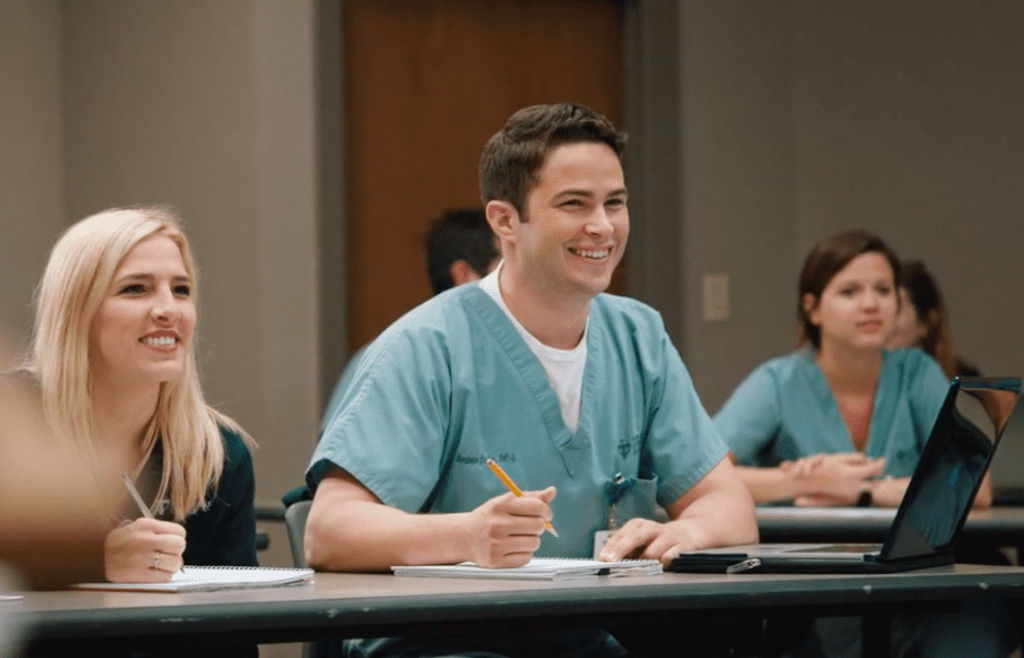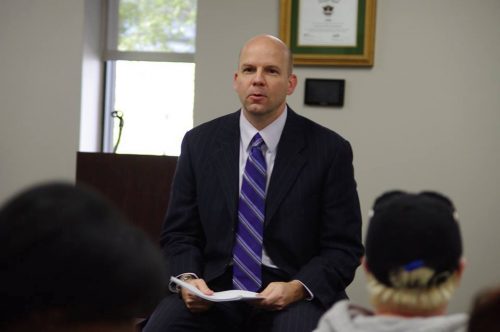A College That Can Endure The Storm

After yesterday’s post about college during the pandemic, I received an e-mail from my friend David Whidden, a theologian at Franciscan Missionaries of Our Lady University, or FranU. It’s the small Catholic college whose primary mission is to train nurses and medical personnel to work in the large nearby Our Lady of the Lake Hospital. David pointed out ways that FranU is in some ways poised to do well in the present and coming crisis of higher education. His e-mail was so good that I asked him to do an interview with me about it. It starts below the photo of Prof. Whidden in the classroom:

RD: I wrote recently that higher education is about to undergo a terrible reckoning in the economic fallout from the pandemic, and that small colleges will be the most vulnerable to shutdown. I expect this will be especially true of small religious colleges without endowments. But you say that your school, Franciscan Missionaries of Our Lady University, is uniquely adapted to thrive during this long crisis. What do you mean?
DW: For the last several years higher education leaders have been talking about the demographic cliff that was set to arrive in 2025 – we knew there was going to be a lot of institutions that would struggle to stay open when that hit, but I think this pandemic has sped up the timeline. Even big universities are financially struggling due to returning room and boarding fees, losing international tuition (international students tend to pay full tuition, so are cash cows for universities), losing athletic revenue while keeping coaches and support staff on the payroll, etc. Marquette, for instance, has lost $15 million in revenue and the University of Wisconsin is going to lose $100 million (which is a small part of their budget, but still!). If students stay at home next fall, small tuition driven institutions that were already dangerously on the brink of insolvency may not make it.
So, as a small, Catholic, 100% commuter school, in a small state, with a very small endowment you would think that we’d be one of the first colleges to fall off the cliff, but I am much more hopeful about our future than I am of other colleges. All the things that used to be disadvantages for us are suddenly advantages. We have no dorms, no Greek life, no sports, and not even a cafeteria, so we haven’t had to return any money to students. And let me add that while the lack of those things might have seemed like a disadvantage before the pandemic, I never considered them to be a disadvantage, because when I walked into a classroom I knew my students had only one reason to be there, which was for an education (for instance, the day after the national championship game I had my first class of the semester at 7:45 am and only had two out of 29 students absent). Most of our budget is spent on what is supposed to be the main mission of higher education, which is to teach and support students, not on things that are secondary to the university. And it keeps our prices low compared to private Catholic colleges at around $10,000 a year for undergraduates, before TOPS (or to put it another way, a lot of our students who went to private high schools in the area pay less for college than they did for high school).
So we don’t really offer the typical ‘college experience’, but what we do offer is an affordable, no frills education that truly leaves our graduates better off in the long run.
Our other secret weapon is that we have a niche in healthcare degrees, so most of our students are enrolled in undergraduate programs like nursing, respiratory therapy, radiologic technology, physical therapy assisting, biology (pre-med or pre-physicians assistant), and the like. As the pandemic has made clear, there is an ongoing need for students with those degrees. But their education all takes place in a Catholic and Franciscan context that forms them to be not just technically proficient, but also deeply human in their approach to their vocations. Next year we are launching a program that will allow us to make sure that all our students are also properly formed with regard to healthcare ethics, which is something that we have also seen a need for in the pandemic. I like to say that we have majors that matter, and that has never been more clear than in the last month.
For instance, because of the strain on the healthcare system here in Louisiana, we were asked to see what we could do to graduate our nursing and respiratory therapy students a month early so they could begin to help immediately. I have a senior nursing student in one of my classes that I’m working to get finished by April 23 because we need him working as soon as possible – and he is going to be a great nurse! Almost all our graduates leave with a job lined up, so their investment in higher education ends up being a wise one. I think a college like ours is going to be deeply attractive to parents and students, especially next year when people might want to stay closer to home.
Also, our classes are small, usually capped for undergraduates at around 32, so we know our students by name. And we are a Catholic college that actually treats the Catholic intellectual tradition with respect, not as a burden to be avoided, but as a gift to be shared. It isn’t perfect, but our students get a faithful Catholic education while they are with us, and even if they don’t come here for that, they often leave appreciating what they were given (and this goes for our non-Catholics too).
Do all the students at Fran U plan to go into the healthcare field, or are there other potential career paths for them?
Well, there are other career paths, since we have degrees in business, theology, psychology, and the liberal arts, but what unites them all is a commitment to service. I do an orientation session for new and transfer students and I always tell them that at FranU their education isn’t about them, but is about the people they are called to go out and serve. So even our non-healthcare degrees are oriented to serving and helping people in important ways. And students respond to this, because deep in their hearts they want someone to tell them that there is more to life than just their own needs and wants, that they will become the best version of themselves by learning to serve others.
A lot of college students show up at their university with no real idea of why they are there (I was once one of those), and so they drift. But put them in a college where they are challenged to think about other people and you can see them mature and rise to the challenges that education presents. Again, for the right kind of student, a university experience like that should be deeply attractive.
Why have you all added a Great Books component to the Fran U experience? If you’re only training people to work in healthcare, why do they need this kind of background?We are launching a Great Books program in Fall of 2021, and while it is primarily aimed at liberal arts majors, we are excited about its possibilities for all students. Our liberal arts program had very few majors, so we decided to reconfigure it as a Great Books program, though our program is quite different than many others, for several reasons.
First, and this is the primary benefit to healthcare majors, it is organized thematically rather than chronologically, which allows for any student to take just one of the courses as an elective and not necessarily feel like she has missed too much. Plus, a thematic approach allows us to offer a Great Books program that fits our mission, so we will have a class on great books on healthcare, healing, etc.
Second, it does not reside in an honors college because we think that all students should have an opportunity to read great books, no matter how challenging it may be.
Our third difference is that every student is required to have a minor in a more ‘practical’ field, such as business, communications, psychology, biology, and so on. We want them to have some marketable skills when they get done.
And fourth, every student will be required to do two internships, again to get some real-world experience and have some marketable skills – the research shows that liberal arts majors with internships have the best long-term outcomes.
Really, though, we just think students deserve a chance to be challenged by texts that ask them difficult questions and rarely provide easy answers, because that is the world they live in. It creates more supple and empathetic thinkers, who are not easily led by whatever the current intellectual fad of the day happens to be.
Additionally, we know from conversations with people like the headmaster of Sequitur, Brian Daigle, who has been very helpful and supportive of our plan, that the students who finish high school in a classical education model rarely can find a college that also values those classical approaches. Why spend twelve years educating your child in a classical model only to have much of that work dismantled at a four year college that does not share your interest?
Broadly speaking, how do you anticipate this crisis changing higher education in the long term?
There are a lot of people who have argued that it will make online courses more acceptable or desired, but I actually think the opposite will happen. I have already had students tell me that one thing they’ve learned is that they do better in the face-to-face classroom. Online can work well for people who are working full-time, and that is good for increasing accessibility, but I think more students will want face-to-face classes after this.
I think that universities that recruit nationally are going to suffer from this because it just does not make a lot of sense to spend $50,000 a year to go to a college 500 miles or more from home, especially if it means you might not be able to see your parents in a quarantine. I think the universities that will prosper will be the low-cost regional colleges that students can drive to and from on a daily basis, rather than stay in dorms. The ‘college experience’ can be fun, but I don’t think parents are going to keep going for it anymore.
Finally, the financial strain of the pandemic and the coming demographic changes are going to result in a fair number of colleges closing. It is going to be Darwinian. I’m not sure who the winners and losers are going to be, but I’m glad that I am at a place that is affordable, mission-focused, and no-frills, because I think that gives us an advantage over a lot of our competitors, though even with those advantages we will have to be careful.
To learn more about FranU, click here. To learn more about David Whidden, click here.
I’d like to know more about small colleges that, like Fran U, are set up to weather this storm. Please feel free to tell your institution’s story in the comments.
Subscribe for as little as $5/mo to start commenting on Rod’s blog.